Sustainability conference reveals a rift in the Malaysian Palm Oil Council
Sustainability conference reveals a rift in the Malaysian Palm Oil Council
Rhett Butler, mongabay.com
May 1, 2008
|
|
Last month’s sustainability conference sponsored by the Malaysian Palm Oil Council (MPOC) revealed a rift between some planters and the industry marketing organization.
Speaking on the condition of anonymity, several oil palm plantation executives distanced themselves from a video created by the MPOC as well as closing remarks by the group’s CEO, Tan Sri Datuk Dr. Yusof Basiron. They said the video and comments provided ammunition for NGOs that accuse the MPOC of greenwashing.
“MPOC must get rid of that video,” said a senior executive with a major plantation firm. “A few of the statements are so blatantly untrue that it undermines our credibility It doesn’t matter that some of the video is accurate. Environmental groups are going to focus on the obvious fallacies and use them against us.”
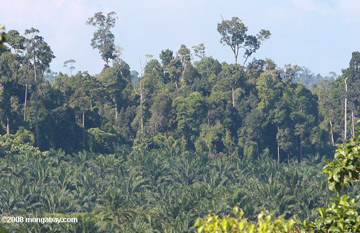 Oil palm plantation abutting tropical rainforest. 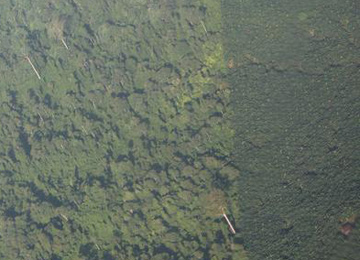 Oil palm plantation abutting logged over forest in Borneo. |
The executive was referring to claims that Malaysian palm oil has always been sustainable and has not resulted in conversion of tropical forest in Malaysia. The video also claimed that 60 percent of Malaysia is covered by rainforest — a number disputed by official government figures — and that oil palm plantations sequester nearly as much carbon as the country’s rainforests.
“Dr. Basiron’s comments are a liability,” said a senior researcher with an agrochemicals firm. “Most of what he said was accurate but when he makes ridiculous claims on biodiversity loss and deforestation, it only serves to help the greenies and tarnish the image of the MPOC.”
“We needs to be as straight-forward as possible,” he continued. “Making false claims is when the MPOC gets in trouble with the international NGOs.”
An executive from another plantation company said he was surprised that the MPOC made the same mistakes with the new video as it did with a previous advertisement that was labeled misleading by Britain’s Advertising Standards Authority (ASA).
“You’d think they would have gotten the second video right,” he said.
Controversial statements by the CEO
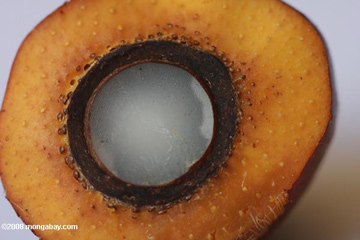 Oil palm fruit |
In closing remarks at the conference, Dr. Basiron made several controversial claims.
“All land can be reforested. There is no reason why you just can’t plant a new forest,” he said, ignoring the difficulty of re-establishing forests on degraded lands.
“With deforestation, all the animals move to the forest,” he said. “They don’t die.”
Dr. Basiron went on to say that the Malaysian palm oil industry has “always” been sustainable and hasn’t resulted in deforestation. He dismissed efforts to increase biodiversity on agricultural lands — a position at odds with the Roundtable on Sustainable Palm Oil’s (RSPO) stated goals.
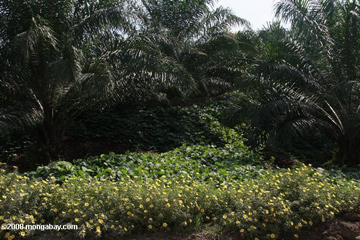 Nitrogen-fixing cover crop — in a sense, a natural fertilizer — and integrated pest management-friendly flowers — a natural pesticide — in an oil palm plantation |
Several plantation executives suggested that it would be more productive to focus on well-established facts to bolster the international perception of Malaysian palm oil. For example, highlighting that most palm oil goes toward food production, not biofuels; that it is the world’s most productive oilseed with a carbon balance favorable to other oil crops including rapeseed and soy; and that palm oil plays an important role in poverty alleviation and rural development.
“Basiron should avoid the provocative but inaccurate statements,” said one executive with a medium-sized plantation firm. “It does nothing for our reputation.”
“Dr. Basiron’s comments threatened to undermine any goodwill that was achieved by the conference,” said a representative from a subsidiary of an American company. “The MPOC video is perfect ammunition for NGOs in that it gives them material for attacking us.”
One environmental group seemed to agree.
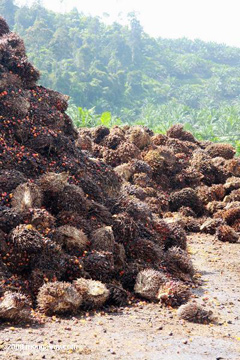 Oil palm fruit at an palm oil mill |
“The video is a great tool for us,” said the head of a wildlife conservation group.
The International Palm Oil Sustainability Conference which met in Kota Kinabalu, Malaysia from April 13-15, sought to address criticism from environmental groups over the sustainability of the industry.
The MPOC is working to distinguish Malaysian palm oil as a premium brand relative to palm oil produced elsewhere, especially in Indonesia. Environmentalists say large tracts of forest are being converted for new plantations in Kalimantan, on the island of Borneo, New Guinea, and Sumatra, putting rare and endangered biodiversity at risk.
Other articles from the International Palm Oil Sustainability Conference
Unilever calls for ban on rainforest destruction for palm oil
(5/1/2008) Unilever, the world’s largest consumer good company, will start using palm oil from certified sustainable sources this year and aims to have all its palm oil certified by 2015, according to a speech delivered today by CEO Patrick Cescau.
Sustainability conference reveals a rift in the Malaysian Palm Oil Council
(5/1/2008) Last month’s sustainability conference sponsored by the Malaysian Palm Oil Council (MPOC) revealed a rift between some planters and the industry marketing organization.
Malaysian palm oil industry puts sustainability in the spotlight
(4/17/2008) Seeking to differentiate its palm oil from that produced less responsibly in other countries, the Malaysian Palm Oil Council (MPOC) sponsored a three-day meeting this week in Kota Kinabalu, on the island of Borneo.
Palm oil boycott an unrealistic approach to conserving biodiversity
(4/15/2008) Boycotting palm oil produced in Southeast Asia in an “unrealistic” and “ineffective” approach to conserving the region’s fast-disappearing rainforests, said a Princeton University researcher speaking at a conference on the sustainability of palm oil. Instead, NGOs should focus on engaging and working with the palm oil industry to reduce its impact on the environment. Addressing the first International Palm Oil Sustainability Conference in Kota Kinabalu, Malaysia, Princeton biologist Dr. David S. Wilcove said that the palm oil industry is too important to the economies of Indonesia and Malaysia to justify blanket import bans on the edible oil used in food, cosmetics, industrial products, and biodiesel. The palm oil industry contributes to health, education, and infrastructure in rural areas.
Other articles on palm oil sustainability issues
Will consumers pay 10% premium for sustainable palm oil?
(5/21/2008) The first shipments of certified eco-friendly palm oil will arrive in Germany during the second half of 2008 according to the head of OVID, a German edible oil industry group.
Indonesian palm oil firms pledge to stop clearing rainforests
(5/13/2008) Palm oil companies operating in Indonesia pledged to stop clearing forests for new plantations reports The Jakarta Post. The move is a response to growing criticism that oil palm expansion is destroying biologically-rich rainforests and contributing to global warming.
Palm oil industry prepares geen initiative to counter criticism
(1/18/2008) Global food and consumer goods giants are backing a plan to certify that palm oil is produced in a way that doesn’t drive destruction of tropical rainforests, reports The Wall Street Journal. The move comes as the palm industry is facing increasing scrutiny — and consumer backlash — for its practices which scientists say are driving large-scale destruction of forests across Indonesia and Malaysia, resulting in massive greenhouse gas emissions.
Eco-friendly palm oil could help alleviate poverty in Indonesia – Palm oil is not a failure as a biofuel
(April 4, 2007) The Associated Press (AP) recently quoted Marcel Silvius, a renowned climate expert at Wetlands International in the Netherlands, as saying palm oil is a failure as a biofuel. This would be a misleading statement and one that doesn’t help efforts to devise a workable solution to the multitude of issues surrounding the use of palm oil.
Palm oil doesn’t have to be bad for the environment
(April 4, 2007)
As traditionally practiced in Southeast Asia, oil-palm cultivation is responsible for widespread deforestation that reduces biodiversity, degrades important ecological services, worsens climate change, and traps workers in inequitable conditions sometimes analogous to slavery. This doesn’t have to be the case. Following examples set forth by the Roundtable on Sustainable Palm Oil and firms like Golden Hope Plantations Berhad, a Malaysian palm-oil producer, oil palm can be cultivated in a manner that helps mitigate climate change, preserves biodiversity, and brings economic opportunities to desperately poor rural populations.